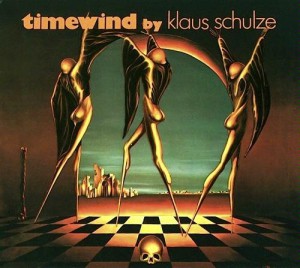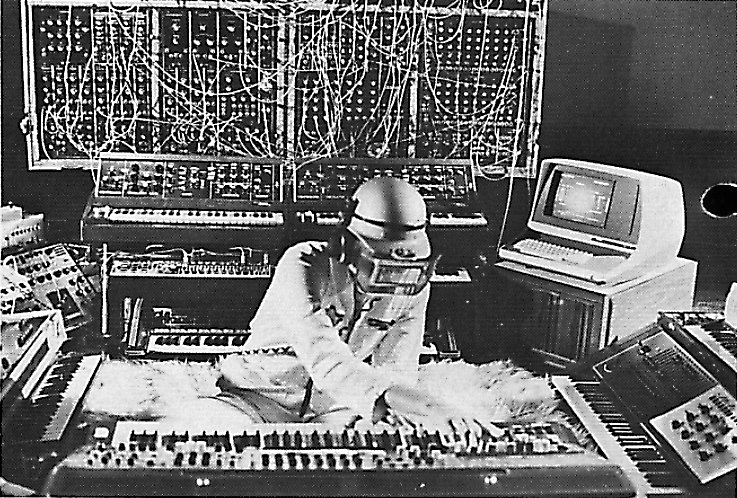An Explorer of Sound, Klaus Schulze turns 70
To those of us who came up listening to electronic music in the 1970s, Klaus Schulze was an icon. The German musician tapped directly into the growing electronic gestalt and created the template of electronic music that many, to this day, are employing. His name has faded in recent decades, but back in the day, he was cited right alongside of Tangerine Dream, Kraftwerk and Can. He turns 70 on August 4th.
I remember the first time I heard Klaus Schulze. A friend of a friend, Dan Kelly, brought in an import copy of Picture Music to WXPN while I was on the air. I put it on and heard a new world of sound. This would’ve been 1975 and it was a life changing moment. Schulze already had three other albums out, Irrlicht, Cyborg and Blackdance. He had also founded the group Ash Ra Tempel and was the drummer on the very first Tangerine Dream album, Electronic Meditation. I remember the phone lines lit solid for all 25 minutes of “Mindphaser” when I played the Moondawn album on WXPN’s Diaspar show in 1976. We only use his first name, the way you just call Miles Davis, Miles. In my world, everyone knows who you mean. Klaus has released hundreds of albums, most of them with compositions that last over 30 minutes. Along with Tangerine Dream, he forged the sequencer sound that is still in use today.
 Klaus Schulze was part of the original genesis of Echoes. The albums he recorded in the 1970s and early 80s reside at the core of music experiences for myself and the central Echoes staff. Albums like Moondawn, Timewind and X, and many more provided the soundtrack for many an imaginary movie during those years. There was something about the pulsing sequencers, free form, note bending Moog solos, and spiraling, Escher-like architecture that spoke of a world outside of conventional rock or classical music. I remember synthesist Mark Shreeve of Redshift describing Mirage as if it had “formed out of thin air, untouched by human hands.” Klaus’s music had that transcendental power, as if it came from somewhere beyond this plane of existence.
Klaus Schulze was part of the original genesis of Echoes. The albums he recorded in the 1970s and early 80s reside at the core of music experiences for myself and the central Echoes staff. Albums like Moondawn, Timewind and X, and many more provided the soundtrack for many an imaginary movie during those years. There was something about the pulsing sequencers, free form, note bending Moog solos, and spiraling, Escher-like architecture that spoke of a world outside of conventional rock or classical music. I remember synthesist Mark Shreeve of Redshift describing Mirage as if it had “formed out of thin air, untouched by human hands.” Klaus’s music had that transcendental power, as if it came from somewhere beyond this plane of existence.
Of course, Klaus was very much human, a garrulous guy with a corny sense of humor full of bad puns and capable of making human mistakes. In the 1980s, as psychedelics gave way to cocaine, Klaus became addicted and it affected his music badly and even he admitted that alcohol and drugs made his music heavier and more turgid. Many of us began drifting away even as Schulze began churning out more and more music. There was the archival 10 CD Silver Edition in 1993, followed by the 10 CD Historic Edition in 1995 and the 25-disc box, Jubilee Edition. Schulze seemed intent on releasing every squiggle, bleep and fart he’d ever committed to disc. To his credit, he also continued to explore with form and technology, heading into experimental directions while his contemporaries desperately tried to sell out. But many of those experiments failed to spark the same interest as his early, groundbreaking works. Many of us became inured to his music and subsequent box sets and albums have gone unnoted by many formerly stalwart fans. That’s why you haven’t heard Klaus as much on Echoes as you have his acolytes like Steve Roach, Mark Shreeve, Robert Rich and Ian Boddy. That, and the fact that he still insists on creating opuses of 20, 30 and more minutes that just don’t work on the radio and are kind of unfair to the six other artists we could play in that period of time. But it should be said that Klaus Schulze is not composing music with radio airplay in mind.
Over the last decade I’ve found myself returning to Klaus Schulze like a parishioner who has left the flock. Most of his catalog was re-released, much of it for the first time ever in the U.S., in deluxe, nicely packaged editions. Despite failing to remaster the material for contemporary audio standards, Klaus’s music still holds up and the mystery and spectacle of Moondawn, Picture Music and Audentity still remains. Even 21st century materiel like Moonlake and Kontinuum have sparks of the old glory.
Klaus has reportedly been in ill health in recent years. After a spate of work that found him in fruitful collaborations with singer Lisa Gerrard of Dead Can Dance on Farscape in 2009 and Come Quietly in 2009 and releasing the masterful Shadowlands in 2013, the prolific artist has been quiet.
It is difficult to imagine the various forms of techno and EDM without Klaus Schulze. He was the original Trance artist. His influence is not only heard in the obvious places like Steve Roach, Robert Rich and Ian Boddy, but it turns up in pop, ambient chamber music and just plain ambient music. Soundtracks to Mr. Robot and Stranger Things are indebted to him, even if they don’t know it.
With his hundreds of albums and collections, it’s difficult to know where to start with the Klaus discography. But here’s the albums that I think reveal the brilliance of Klaus Schulze.
FIVE ESSENTIAL KLAUS SCHULZE CDs
Timewind
Body Love
Mirage
X
Trancefer


I got turned on to Klaus 15 or 16 ’75-ish listening to WXPN’s Diaspar. So much good music. Happy Birthday Klaus.
Thanks for remembering the old daze Lou!
Thanks, John,
for remembering und still praising our old friend KS and his still amazing music.